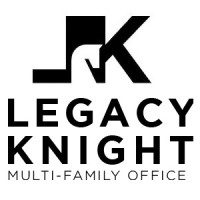From college basketball to advising the elite, McCall Tomeny’s journey reflects discipline and ambition. Now leading Legacy Knight’s family office business, he helps ultra-wealthy clients navigate investments, estate planning, and more, setting the firm apart with its independent, client-focused approach.
Background

Becoming exceptional in the world of business starts long before you even reach a prestigious firm. McCall is the epitome of this philosophy through his success in basketball, playing at the collegiate level at Loyola University New Orleans. While at Loyola, he helped with Loyola’s first SSAC West Division Championship in 70 years. In an interview following the completion of the strenuous SEALFIT Kokoro, McCall says to “have always had a passion for bettering [himself], whether physically or mentally”.
Following graduation he worked at JP Morgan Chase, and is currently at Legacy Knight. Legacy Knight is a multi-family office offered for those with over $25 million in net-worth. They launched in 2020 and have achieved over $1.5 billion dollars in assets. McCall, still in the early stages of his career, has built up quite the resume, and will no doubt continue to pave a path of success.
Interview
Barrett
Talk me through a few different daily scenarios in your role at a multi-family office like Legacy Knight.
McCall Tomeny

In my role as head of the family office business at Legacy Knight, I’m the main point of contact for our clients, essentially acting as the head of their family office. My work ranges from advising on estate and tax planning or managing investment portfolios to more personal matters, like guiding their children as they start their careers. We handle everything from financing a new aircraft to helping them find a doctor. Over time, we become deeply integrated into their lives, building strong relationships with the entire family. While I focus on being a strategic partner and advisor, my team supports the day-to-day details.
Barrett
Could you elaborate on Legacy Knights involvement and interest in GP stakes.
McCall Tomeny
GP stakes are attractive investments because they allow you to own a piece of the management company behind large alternative asset firms, not just their underlying funds. This means you benefit from contractually obligated management fees and carried interest from profits, as well as the gross returns on the funds the GP invests in directly. These investments can become highly lucrative if the firms continue to grow and raise larger funds over time. However, these opportunities are typically reserved for high-net-worth individuals or institutions, though the average investor can gain exposure by purchasing shares in publicly traded companies like Blue Owl (OWL), Blackstone, or Apollo.
Barrett
It’s common for people to invest in mutual funds and ETFs through their 401ks and IRAs, however, what alternative asset do you see gaining popularity amongst the common investors?
McCall Tomeny
While ETFs and mutual funds remain the simplest and most common investment options for individuals, we’re seeing growing interest in alternative assets among everyday investors. Direct indexing, for example, allows investors to own individual stocks that replicate an index like the S&P 500, offering more tax efficiency by enabling tax-loss harvesting. In the private markets, interval funds are gaining traction as they provide access to private credit and equity with shorter lock-up periods, making them more liquid. Products like Blackstone’s BREIT (real estate) and BCRED (credit) are also popular retail options, though they typically require minimum investments of $25,000. While these are accessible alternatives, we generally focus on institutional private assets where we can negotiate better terms directly with managers.
Barrett
How does Legacy Knight attempt to be innovative and outshine competitors?
McCall Tomeny
Our focus on innovation stems from our model and approach. Unlike many firms that have sold to private equity or large corporate entities, we’ve remained independently owned by our team and families. This independence keeps our incentives aligned with our clients’ best interests. We also prioritize exclusivity, bringing on only a few high-quality families each year and maintaining high minimums to ensure we grow thoughtfully. This allows us to source unique, compelling investments with favorable terms—opportunities that larger firms competing at massive scales can’t access as effectively. Additionally, our personal touch and deep integration with each family make us stand out; every client feels heard, valued, and never like just a number.
Barrett
How would you compare your time at a global giant of a company, JP Morgan, to your time at Legacy Knight?
McCall Tomeny

JP Morgan was an excellent training ground and a great place to start a career. It gave me the credibility and network that allowed me to help build Legacy Knight. However, I knew early on that I didn’t want to spend my career as just a number in a large corporation. I wanted to do something entrepreneurial, to have ownership in a business and play a key role in shaping its growth. That’s the biggest difference—the entrepreneurial nature of my work at Legacy Knight compared to the structure of a global giant like JP Morgan. Still, there’s value in spending a few years at a big firm to gain experience and credibility before striking out on your own.
Take-aways
1. The Complex Role of a Family Office Head
At Legacy Knight, Tomeny’s responsibilities extend far beyond typical financial management. He serves as a strategic advisor on estate planning, tax strategies, and investment portfolios, while also addressing highly personal needs like mentoring family members or assisting with major purchases. His role demands deep integration into clients’ lives, fostering trust and long-term relationships. While he focuses on strategic oversight, his team manages the operational details, allowing him to maintain a strong personal connection with each family.
2. GP Stakes as High-Value Investment Opportunities
Tomeny highlights the appeal of investing in GP stakes, which provide ownership in the management companies of alternative asset firms. These investments generate consistent revenue from management fees and carried interest while also benefiting from direct fund returns. Although these opportunities are usually reserved for institutions or ultra-wealthy individuals, retail investors can gain indirect exposure through publicly traded companies like Blue Owl, Blackstone, or Apollo. Tomeny notes the lucrative potential of GP stakes, especially as firms grow and scale over time.
3. Expanding Access to Alternative Assets
Tomeny points to innovations like direct indexing, which offers tax efficiency through tailored portfolios, and interval funds, which provide access to private credit and equity with shorter lock-up periods. Products like Blackstone’s BREIT and BCRED make private market investments more accessible to affluent individuals. However, Legacy Knight focuses on institutional private assets, allowing for better-negotiated terms that are unavailable in standard retail options.
4. Legacy Knight’s Competitive Edge: Independence and Exclusivity
Legacy Knight’s success lies in its independence and client-centric approach. By avoiding private equity ownership, the firm aligns its incentives with clients’ best interests. Its strategy of onboarding only a few high-quality families each year ensures exclusivity, fosters strong relationships, and allows the team to identify unique investment opportunities with favorable terms. This contrasts with larger firms, which often operate at a scale that limits personalized service and flexibility.
5. The Value of Big-Firm Experience in Entrepreneurship
Tomeny reflects on his time at JP Morgan as a valuable foundation for his career. The global firm provided credibility, a strong network, and essential skills that enabled him to co-build Legacy Knight. However, he found the entrepreneurial environment of Legacy Knight more fulfilling, allowing for greater ownership and creativity. The shift from a structured corporate setting to a smaller, dynamic firm highlights the importance of experience in shaping one’s ability to lead and innovate in a competitive industry.
